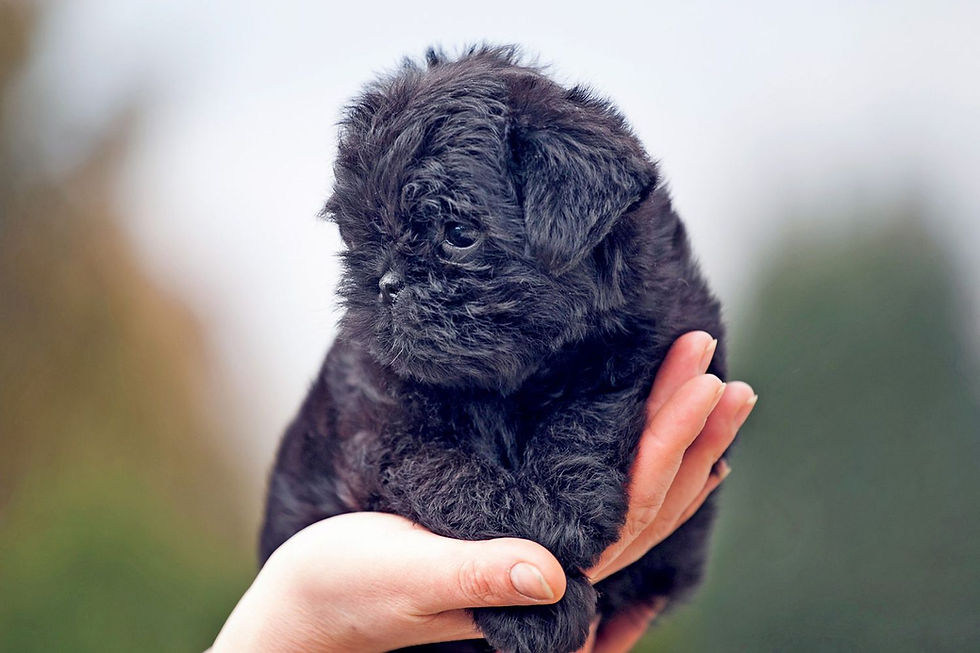Breed Spotlight: The Affenpinscher
- Windsor Contributor

- May 9, 2024
- 3 min read
Updated: May 13, 2024

Dogs of the Affenpinscher type have been known since about 1600, but were somewhat larger and in colors of gray, black, fawn, black and tan, gray and tan, and even red. White feet and chest were also a common thing. These dogs were known as Ratters or Ratting Terriers and were just the farm or store dog, running at large and sleeping in the stables, Their purpose was to kill rats.

From all history reports, a man from Lubeck, Germany was the first to breed them in earnest. Soon they were bred to a smaller size and used in the home as mousers. Mice were the great fear of the women of the house due to their long skirts. Dogs of the same description bred in other parts of Germany were of salt and pepper in color and more of the Schnauzer/Ratter type of dog. Early breeders of the two did much crossing of this breed with other breeds to perfect what they were looking for in a house dog. Some of these other breeds included Pug (this gave rise to the Brussels Griffon) and the smooth haired German Pinscher.
Around the 17th or 18th century there was a popular breed in Germany called Schoosbundrassen (which literally just translates as "the pet dog") which were more of the type of the present Affenpinscher. The cross of the small standard Schnauzer and the larger Affenpinscher is discounted by many of the very old German breeders. From Mrs. Woods, an English and International judge, come excerpts from old German records and private letters describing the little black dogs, their characteristics, actions, coat texture and such, the same as our present day Affenpinscher. These letters are dated in 1720. It appears there were two sizes with slight differences and actions. The larger becoming the Miniature Schnauzer and the smaller becoming the Affenpinscher.
Many breeds have a detailed history of their breed’s arrival in America, but the Affenpinscher is not so fortunate. All we have is an article published in the April 1950 issue of the AKC GAZETTE that says the breed was imported in the mid-thirties (around the time they were recognized by the AKC; 1936) and wide coverage was given to the event in the newspapers and in the newsreels of the day. Further elaboration is scant.
The Affenpinscher is a happy combination of charm and attitude. A small dog with stamina, agility, and great courage, yet upon occasion displays sensitivity and gentleness. Unusually intelligent and quick to learn, the Affenpinscher possesses a complicated intelligence not seen in many of the other toy breeds.
It is fair to warn a prospective Affenpinscher owner that this breed often possesses a "big dog in a small body" mentality, not unlike some other small breeds such as the Miniature Pinscher. This boldness makes it necessary to be cautious that your little "Rottweiler wannabe" does not inadvertently provoke an attack by a large dog. It is this same bold attitude, however, that also make them such a joy to own.
The Affenpinscher is a model dog with which to travel. They adjust readily and confidently to changing circumstances. They are clean and require a minimum amount of grooming. These little dogs are alert and ready at all times to protect their owner, his home, fellow pets within the home, and possessions.

The Affenpinscher is a healthy breed. Currently, they are not prone to any specific genetic debilitating or life threatening diseases. The health of this breed is due directly to the combined efforts of reputable breeders nationwide in their shared common goal to maintain the health of the Affenpinscher. When searching for an Affenpinscher puppy, most breeders you encounter are likely to be reputable.
However, they are active and tend to jump a lot, and in doing so they may encounter problems with their patellas (slipping kneecaps). Affenpinschers have also been known to have problems with hip dysplasia, Legg-Calve-Perthes and some eye issues (eye issues most commonly present with advancing age, as with many other breeds and breed mixes). But the bottom line is that Affenpinschers, to date, have no known inherited illness, deformity, or genetic malfunction.
Recommended Health Tests from the National Breed Club:
Patella Evaluation
Ophthalmologist Evaluation
Resources:








Comments